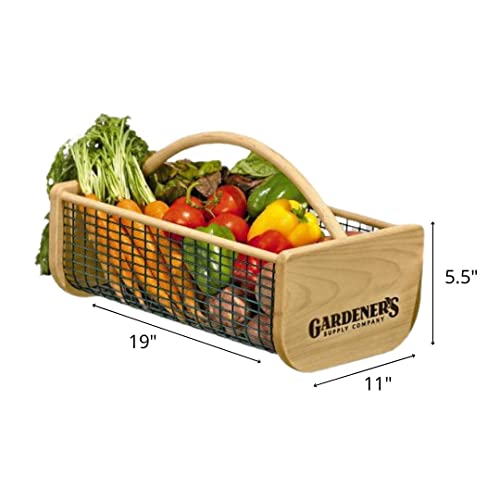When to pick eggplant – for a big harvest of this flavorful kitchen ingredient
Harvesting your eggplant at just the right time will give you the most delicious and tender fruit to cook with

Tenielle Jordison
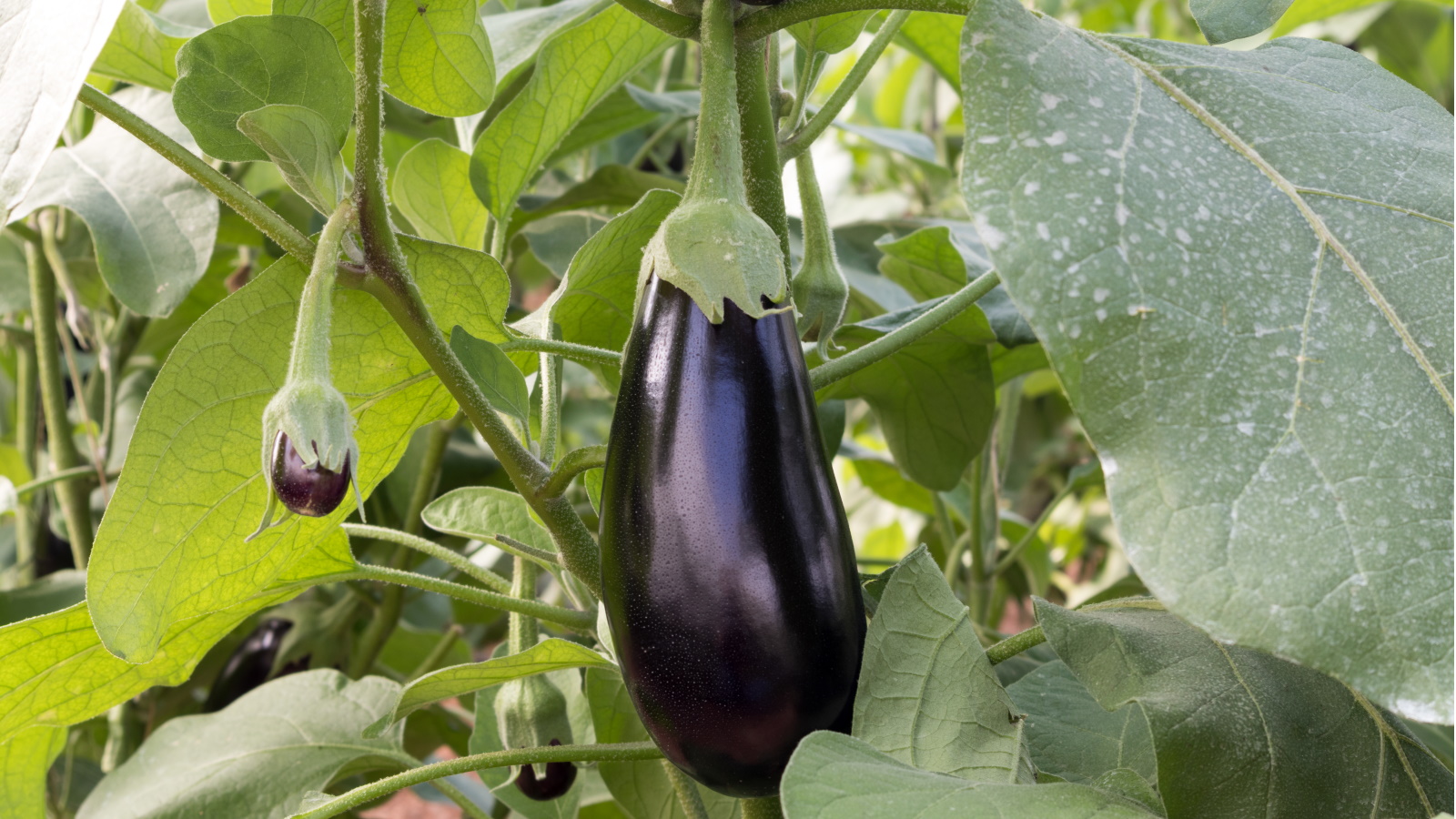
Eggplants are sun-lovers that make the perfect addition to your summer garden and are a tasty ingredient to harvest. It's important to learn how to pick them from your garden to prevent damage and yield the best harvest.
Learning how to grow eggplant can be a little tricky and requires the right climate and care, and there are certainly eggplant growing mistakes to avoid if you want to grow them successfully. Luckily, however, picking eggplant is much more straightforward so you can easily reap the rewards of your hard work.
We've spoken to vegetable growing experts to find out when exactly to pick eggplant so you don't harvest them too soon or too late.
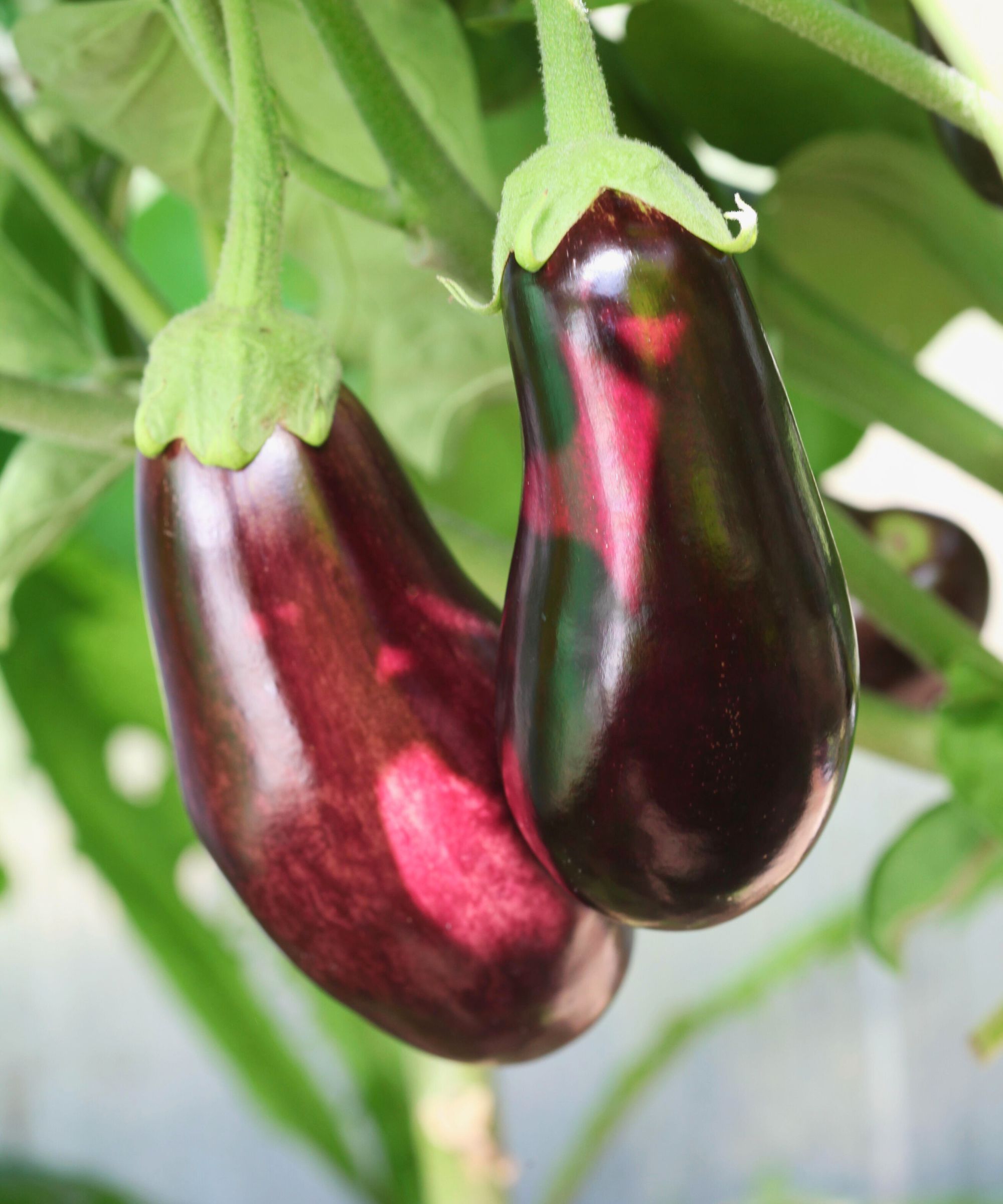
When to pick eggplant - a quick look:
You'll know your eggplants are ready to pick when the fruits become firm and have deep-colored, glossy skin. The size of your eggplant will depend on the variety, so it's best to do some research about the specific eggplants you are growing. You can expect them to be ready to harvest in August, but you can also pick them earlier to ripen inside if it's a colder summer. Try leaving them on a dry surface, or even place them with bananas in a bag, to encourage ripening. Take care to check on your harvested eggplants so they don't become overripe or rot.
When to pick eggplant
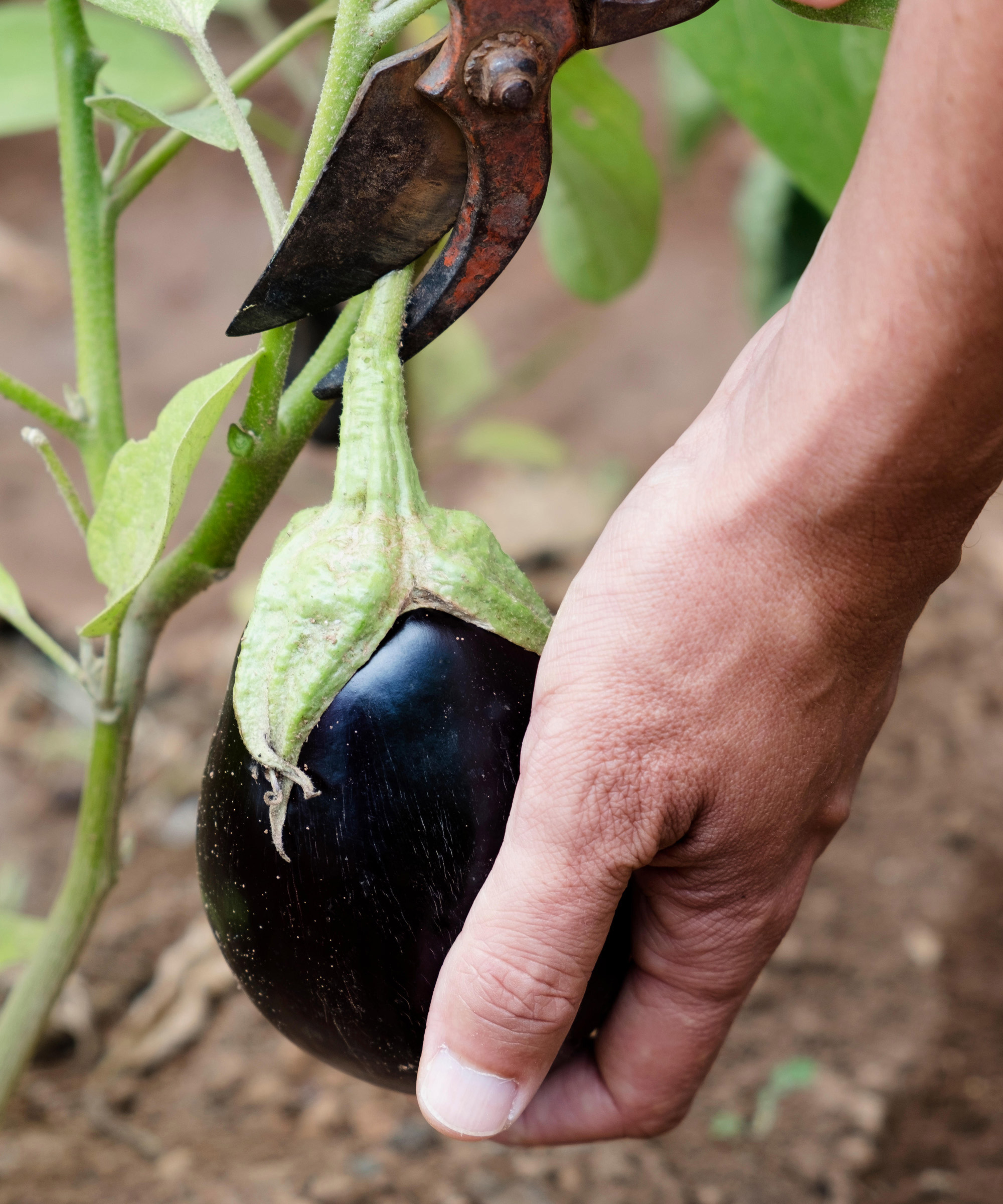
Generally speaking, the best time to pick eggplant is from mid-summer onwards, around the months of July to September. This can change based on what variety you have and the weather patterns during the growing process, however, so it is good practice to learn what the ideal eggplant looks and feels like before harvesting any of your well-deserved fruits - not doing so this for any vegetable you're growing is a common vegetable gardening mistake.
'Eggplants are normally harvested anywhere from mid-summer and early fall,' says Annette Hird, expert gardener at Easy Urban Gardens. 'The plants normally take around three months to grow before they have harvestable fruits,' she adds.
It's best to pick eggplants when they are slightly immature to prevent over-ripening. Overripe fruits taste bitter and their increased growing time means they are more likely to be stolen by garden pests and mammals. It can be worth investing in the best flowers to plant in a vegetable garden to deter pests to protect your eggplants from being damaged.
Design expertise in your inbox – from inspiring decorating ideas and beautiful celebrity homes to practical gardening advice and shopping round-ups.
As a general rule of thumb, eggplants mature between 100-120 days after the seeds are planted or 60-85 days from a transplanted plant.

Annette Hird has an Associate Diploma in Horticulture and is an urban gardening expert. She has worked as a professional propagator and managed, maintained and improved many urban and rural gardens. She also enjoys growing her own fruit, vegetables, herbs and flowers as well as many different types of ornamental plants.
How to know if eggplant is ready for picking
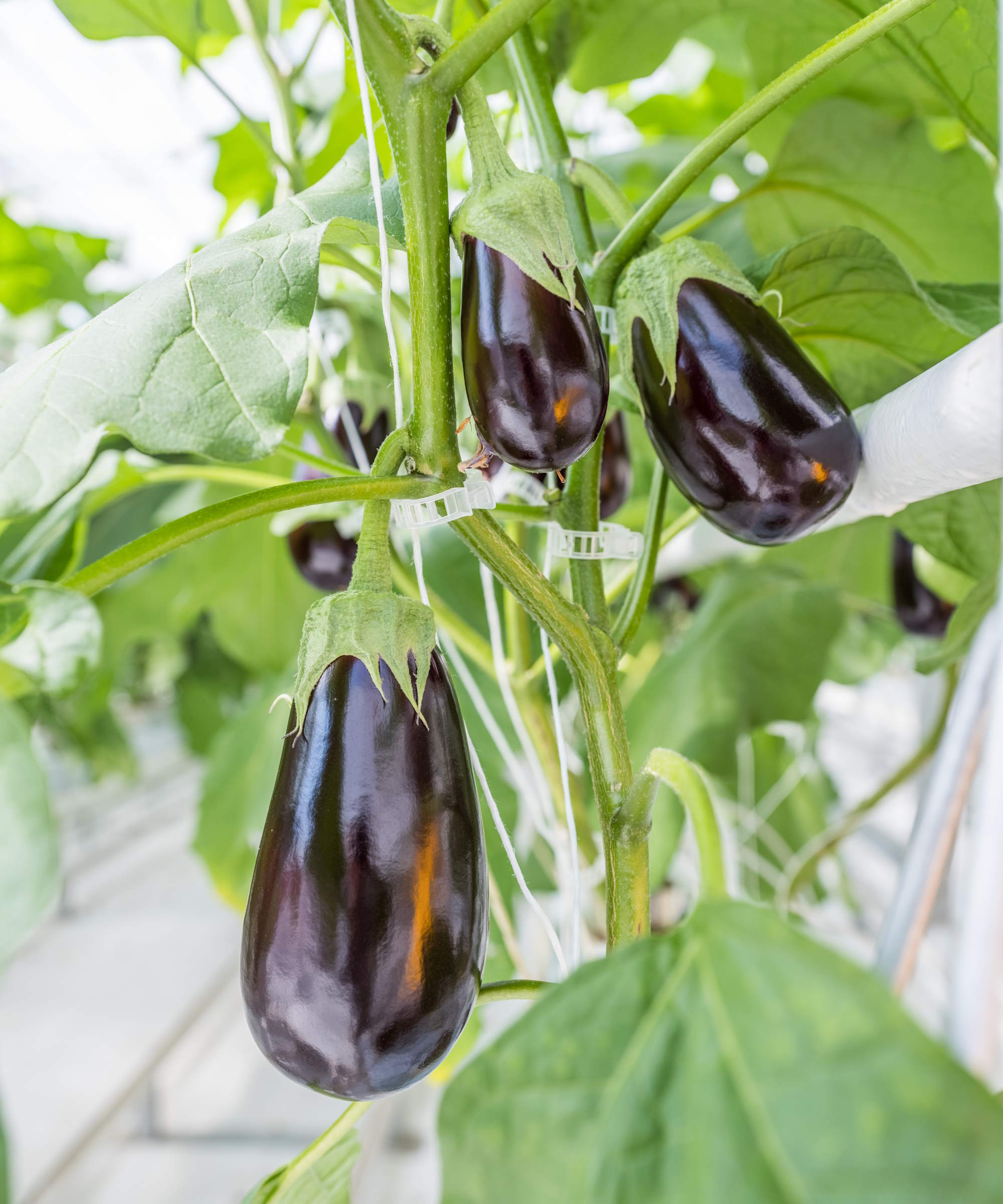
Eggplant is part of the same family as tomatoes, and like harvesting tomatoes, the eggplant's skin can tell you a lot about their ripeness.
'The fruits should be harvested once they've reached a dark color and the skin is glossy,' says Annette. 'One way to test if they're ready to harvest is to gently press the skin with your finger. If this leaves a slight dent and the skin doesn't bounce back, then the fruits are ready for harvest,' she adds.
When the eggplants become dull, it indicates they're overripe and are likely to be more bitter in taste.
Another way to check eggplant ripeness if you're new to growing these crops is to cut into the fruit to check the flesh. In inside should be a cream color with visible seeds. As you become more practiced, you won't need to cut into the fruit.
'You'll also want to check the variety description, which will show the mature length by inches, before harvesting to ensure your variety has reached its mature size,' says horticulture expert and founder of Yardwork, Michael Clarke. 'Mini eggplant varieties are harvested around three inches long, while larger eggplant varieties will grow between seven to 10 inches long,' he adds.

Michael Clarke is the founder of Yardwork and Pulled, the online platforms for everything home and garden. He has a degree in landscape architecture and horticulture from the University of California Davis.
Shop for eggplant harvesting essentials online
FAQs
How do you pick eggplant?
You need to be careful when picking eggplant as the plant can have thorns that may irritate the skin. Wearing long sleeves and gardening gloves is recommended when picking eggplants.
Much like tomatoes, eggplants can bruise easily, so you need to handle them carefully when picking them. 'You need to use a pair of secateurs or a sharp knife to cut the eggplants from the plant. Avoid trying to pull them off because this will damage the plant,' says Annette Hird, expert gardener at Easy Urban Gardens. Aim to cut the stem of the eggplant just above the cap of the fruit.
The plant can produce eggplants throughout the growing and harvesting season, so it is worth checking our plant every few days for a few weeks to harvest eggplant fruits in their prime and for a heavy yield.
How do you store home-picked eggplant
Once picked, eggplants are best eaten straight away. If you need to preserve them or have too many, however, wrap your eggplants in paper towels to absorb excess moisture and then inside an unsealed plastic bag to allow for air circulation. Store them in the crisper drawer of your refrigerator for up to four days. The problem with storing eggplant in the refrigerator is it can affect the quality and texture of the fruit, so it is best eaten sooner than later.
Will eggplant ripen after it’s picked?
Eggplants can be ripened after harvesting but it can be a difficult process with varying results. Because eggplants are warm weather crops, you can attempt to ripen eggplants on your counter in your kitchen at room temperature.
To speed up the process, wrap the eggplant in a paper bag with a banana or two. Banana fruits produce ethylene, the chemical that ripens fruit. The problem with this method, however, is it can over-ripen the eggplant and cause rotting, so you need to be vigilant when checking your fruits.
Once ripened, eggplants should be stored in the fridge and consumed before they turn soft or mushy.
It's also possible to grow dwarf eggplant varieties indoors. They'll take the same amount of time to grow as outdoor eggplants, but you can grow them year-round so long as you can keep room temperatures up and provide enough light. You can also fertilize eggplants to give them a boost of nutrients and encourage a bumper harvest.

Chiana is Homes & Gardens’ kitchen appliances editor. With a lifelong passion for cooking and baking, she grew up experimenting in the kitchen every weekend with her baking-extraordinaire Mom, and has developed a great understanding of how tools and appliances can make or break your ideal relaxing kitchen routine.
- Tenielle JordisonGardens Content Editor
